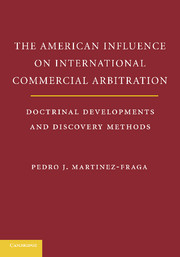 The American Influences on International Commercial Arbitration
The American Influences on International Commercial Arbitration Book contents
- Frontmatter
- Contents
- Table of Citations
- Acknowledgments
- Foreword
- Preface
- 1 Introduction
- 2 The Formation and Transformation of the Status of International and Domestic Arbitration in the United States
- 3 Wilko v. Swan, Scherk v. Alberto-Culver, and Mitsubishi v. Soler: Crafting a Level Playing Field
- 4 Procedural Change and 28 U.S.C. §1782: The Taking of Evidence v. Common Law Discovery
- 5 The Gathering of Evidence v. Common Law Discovery
- 6 What Has Really Happened? The Effects of a Trilogy Examined
- 7 The New Unorthodox Conception of Common Law Discovery in International Arbitration
- 8 And Now How Do We Avoid 28 U.S.C. Section 1782 in International Commercial Arbitration?
- 9 Perjury & Arbitration: The Honor System Where the Arbitrators Have the Honor and the Parties Have the System
- 10 Developments in the Apportionment of Jurisdiction Between Arbitrators and Courts Concerning the Validity of a Contract Containing an Arbitration Clause, and Transformations Regarding the Severability Doctrine
- 11 U.S. Arbitration Law and Its Dialogue with the New York Convention: The Development of Four Issues
- Conclusion
- Appendix A Duelo a Garrotazos
- Appendix B Selected Cases
- Appendix C The New York Convention, The Federal Arbitration Act, and 28 U.S.C. §1782
- Appendix D Amendments to 28 U.S.C. §1782
- Appendix E Selected Rules of Civil Procedure
- Appendix F Geneva Convention of 1927
- Appendix G Selections from the Legislative History of the Federal Arbitration Act
- Index
- References
8 - And Now How Do We Avoid 28 U.S.C. Section 1782 in International Commercial Arbitration?
Published online by Cambridge University Press: 11 July 2009
- Frontmatter
- Contents
- Table of Citations
- Acknowledgments
- Foreword
- Preface
- 1 Introduction
- 2 The Formation and Transformation of the Status of International and Domestic Arbitration in the United States
- 3 Wilko v. Swan, Scherk v. Alberto-Culver, and Mitsubishi v. Soler: Crafting a Level Playing Field
- 4 Procedural Change and 28 U.S.C. §1782: The Taking of Evidence v. Common Law Discovery
- 5 The Gathering of Evidence v. Common Law Discovery
- 6 What Has Really Happened? The Effects of a Trilogy Examined
- 7 The New Unorthodox Conception of Common Law Discovery in International Arbitration
- 8 And Now How Do We Avoid 28 U.S.C. Section 1782 in International Commercial Arbitration?
- 9 Perjury & Arbitration: The Honor System Where the Arbitrators Have the Honor and the Parties Have the System
- 10 Developments in the Apportionment of Jurisdiction Between Arbitrators and Courts Concerning the Validity of a Contract Containing an Arbitration Clause, and Transformations Regarding the Severability Doctrine
- 11 U.S. Arbitration Law and Its Dialogue with the New York Convention: The Development of Four Issues
- Conclusion
- Appendix A Duelo a Garrotazos
- Appendix B Selected Cases
- Appendix C The New York Convention, The Federal Arbitration Act, and 28 U.S.C. §1782
- Appendix D Amendments to 28 U.S.C. §1782
- Appendix E Selected Rules of Civil Procedure
- Appendix F Geneva Convention of 1927
- Appendix G Selections from the Legislative History of the Federal Arbitration Act
- Index
- References
Summary
Adherence to Section 1782(a) in the context of international commercial arbitration reconfigures the procedural law applicable to arbitration with respect to the gathering of documents and information by parties, and even the very commencement of the proceeding. Post Intel and progeny, an “interested person” may prosecute a Section 1782(a) petition with the federal district court in the United States prior to actually filing and serving a request for arbitration so long as the filing of such arbitral proceeding is “reasonably imminent.” Thus, the arbitration, which now as a matter of law constitutes a “foreign or international tribunal,” need not even be pending before prospective respondents find themselves with a binding normative legal obligation to respond to discovery pursuant to the Federal Rules of Civil Procedure. Intel and progeny divest prospective institutional arbitral centers from engaging in the most rudimentary arbitration case management exercises. Similarly, this extraordinary doctrinal development in U.S. arbitration – as in private procedural international law – also divests arbitral tribunals of all authority concerning the applicable standard, the conduct, the admissibility, and the nature and character of the disclosure and exchange of documents and information between parties to the arbitral proceeding.
Irrespective of whether Section 1782 is deemed a positive doctrinal development in both U.S. and international arbitral proceedings, there are numerous paradigms pursuant to which risk assessment models would suggest that a party to a transaction would be decisively and materially disadvantaged should a dispute arise precipitating the invocation of an arbitration clause and, consequently, the possible filing of Section 1782 petitions by the adverse party.
- Type
- Chapter
- Information
- The American Influences on International Commercial ArbitrationDoctrinal Developments and Discovery Methods, pp. 86 - 117Publisher: Cambridge University PressPrint publication year: 2009


